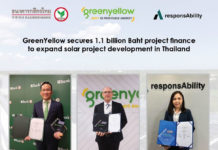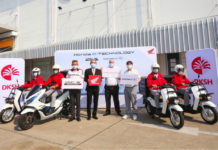Leading international property guide gives thumbs up to Bangkok rental yields
While the Thai economy as a whole has been fairly stagnant, the independent Global Property Guide has given the stamp of approval for what it termed a significant rise on rental yields on larger apartments in the more popular areas of Bangkok for foreigners. Those areas, specifically, are Sukhumvit Road, Silom, Sathorn, Riverside, Rama III, and Central Lumpini, all classified as ‘upscale residential areas’.
According to the April 2015 report rental yields in Bangkok range from five to 6.8 percent with smaller apartments earning higher yields than bigger apartments, although that difference is now ‘very much smaller.’
The difference can be expressed via an example of a 65-square metre apartment in central Bangkok which can earn yields of around 6.8 percent, while a 350-square-metre apartment in a similar location will earn approximately 6.16 percent.
A 40-square-metre Bangkok apartment in the aforementioned upscale areas is currently priced around 4.06 million baht). This equals 101,580 baht per square metre.
That apartment should be able to be rented out for the equivalent of 21,500 baht per month, thereby giving a yield of 6.36 percent.
At the top end of the scale, a 250-square-metre apartment costs around 25.9 million baht to buy and offers a return of about 105,000 baht per month in rental returns. That’s a yield of just 4.9 percent.
Basically, unless there was a good long-term reason to buy and lease out a large apartment in Bangkok, investors would be better served purchasing five or six smaller apartments, especially if they’re looking for a stronger percentage return on investment.
By way of further comparison, the Global Property Guide notes that the price of a single detached house across Thailand had risen by about 4.81 percent, although that figure was only to the second quarter of 2014.
Bangkok is considered as a ‘moderate’ on the Long Term Investment Ratingi, coming in with a 5.13 percent yield. Sydney, Australia rates a ‘poor’ 4.39 percent as does Kuala Lumpur, while Singapore, at just 2.83 percent rental return on investment, is classified as ‘very poor’.
Currently, Jakarta is showing a good 7.05 percent yield, although the downsides are high rental income tax, high transaction costs and belief the Indonesian capital may well be already overbuilt.
As the Global Property Guide notes, among the advantages to buying property in Thailand, especially Bangkok, is the high yields and what they term a ‘pro-landlord rental market’ while ‘unusually low prices offer buying opportunity’. The downsides are that ‘foreigners cannot buy land’ and the buying process is ‘complicated’.
That Bangkok will remain a relatively good deal for those looking to invest for income is almost guaranteed.










